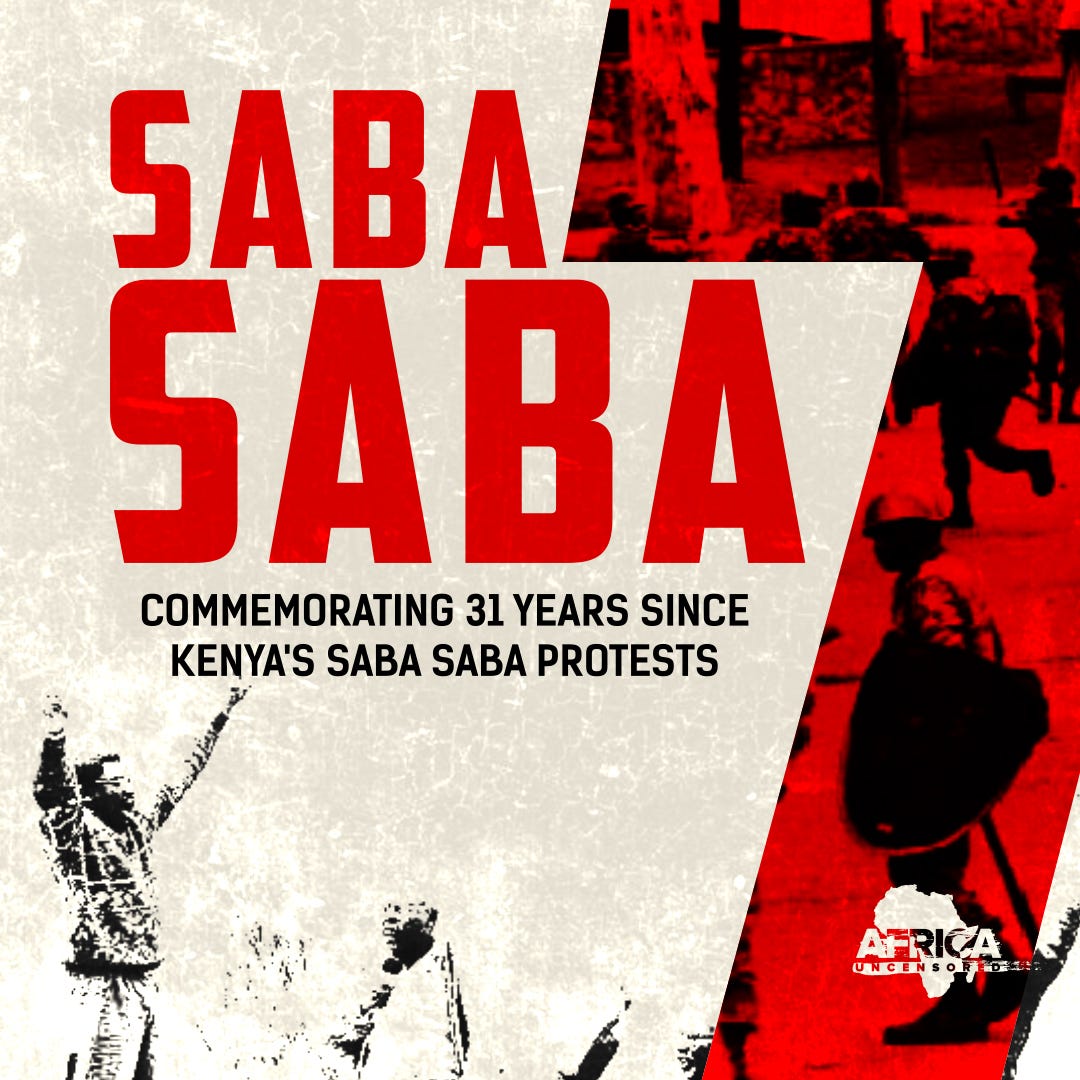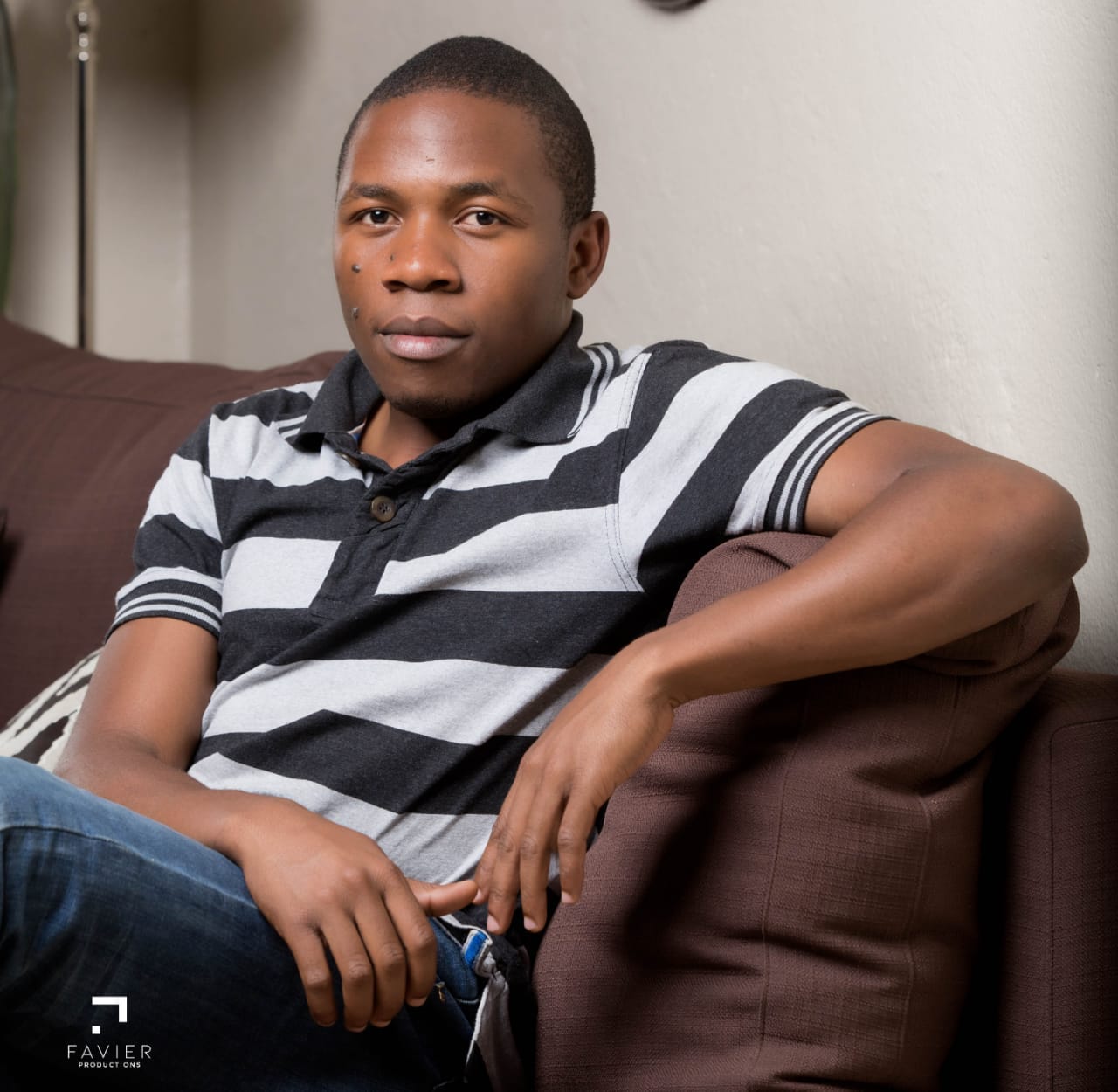If you are 31 years old this year, then you will have been born in the same year as one of Kenya's most momentous political events; Saba Saba (7/7 - as it took place on the seventh of July, 1990). On this day, proponents of Kenya's opposition to decades-long misrule under Daniel Arap Moi organised a rally that announced the rebirth of multi-party politics, whether the law agreed with it or not. Veteran Kenyan journalist Kwamchetsi Makokha called it a "seismic event" that was "the first serious organised challenge to repression through defiance in Kenya". As this day approached, Kenya had been hamstrung by a battered economy that had barely survived what's been called Africa's lost decade, the 1980's. The country was in the throes of a confrontation between civil society and political groups pushing for the re-introduction of multiparty democracy. Students, lecturers, and ordinary folk had been jailed, tortured and killed in Kenya's infamous torture cells, seated beneath Nyayo house. It is a government building whose reputation is ancient history for a generation (read on for a look back into this dark time). Yet, 31 years later, the relevance of a day of rage against Kenya's and indeed Africa's politics bears serious consideration. Kenyans recently watched an appeal to a successful legal challenge against a move to amend its 2010 constitution; this happening in the context of continuous undermining of the law by, among other powerful agencies, the state itself. In South Africa, former President Jacob Zuma continues to test the court's judicial authority by failing to abide by a ruling committing him to 15 months in prison.
As Kabugi Mbae writes for this edition, across the continent, old men continue to linger in power through the use of laws that were crafted to keep them there. Saba Saba in Kenya was the spirit of repudiation of strong-arm tactics and strong man politics. If the signs of current times are to be read, then this spirit may yet have use today, under the guidance of a new generation of Africans. This Newsletter focuses on the day, with reflective articles written by Kenya's Chief Justice Emeritus Dr. Willy Mutunga.
One more thing...
This Thursday, we host our monthly conversation, "Join The Newsroom". This time, we discuss a worrying occurrence from a few weeks ago. A thread by Africa Uncensored's Web Editor, Emmanuel Chenze about Kenyans being unwittingly registered to political parties that they had never endorsed touched off serious concerns about the security of Kenyans personal data. That the discovery was made under the auspices of political competition (which some Kenyans have a healthy suspicion for) made it even more urgent to be discussed. This Thursday, join our newsroom at 7 pm to hear from Chenze as he recounts how he found this data anomaly. We'd also like to know what you are worried about when it comes to your data. You can register here.
Before Saba Saba - Remembering Kenya's torture chambers
In Tanzania, the day Saba Saba commemorates the founding of Tanzania's first ruling party, the Tanzania African National Union, TANU. In Kenya, it commemorates one of the first steps to the ousting of Kenya's independence party, the Kenya Africa National Union, KANU. That would happen a decade later. But like all days worth remembering, the Saba Saba tree was quite literally watered with the blood of hundreds of Kenyans who were tortured by the KANU regime. The symbol of that dark time is a tower that now houses a number of government offices - one that young Kenyans pass by every day, some with no memory of what happened there between the years 1985 to 1994. Check out this piece, which reflects on a most important chapter in Kenya's political history:
Why it’s hard to replace an African president from power
Africa has a long list of presidents who have been in power for decades. While many are incumbents, others have been forced by circumstances to leave office. Kabugi Mbae looks at why it's difficult for African leaders to voluntarily relinquish power and what can be done about it. Read the full article here!
Former Chief Justice Dr. Willy Mutunga - A voice of protest since the 1970s
Among the voices that stood up against tyranny in the 1970s was that of Dr. Willy Mutunga. A lecturer at Nairobi University back then, he was jailed among a generation of people who voiced their dissent for repression under Kenya's first President, Jomo Kenyatta, and later, Kenya's second President, Daniel Arap Moi. On the 30th anniversary of the Saba Saba Protests, Dr. Mutunga wrote the following:
"...Three decades after Saba Saba, the frustration felt by this generation and its children runs deep. Why? Power is still largely imperial, exercised in a brutal and unaccountable manner, as institutions flail and falter." His words, a heavy indictment of power under Kenya's 4th President, carry even more weight given his former role as the country's first Chief Justice under a new constitution, the milestone document that was to mark a turning point since Saba Saba. You can read that quote and the rest of this reflective piece, first published by our friends at The Elephant here!
So you are now registered to a political party (whether you like it or not)…
Worried about who holds your data and what they are doing with it? You are not alone. Millions across the globe are concerned about the use and misuse of their private data by large corporations and governments. Kenyans fears were manifested when some discovered that they had been registered to political parties without their consent. Africa Uncensored's web editor Emmanuel Chenze was among the first people to discover this misuse and published a Twitter thread on the same. Want to know how he found out, and have a real conversation about those data concerns? What about what we at Africa Uncensored should be looking into?
Join us this Thursday at 7 pm for a conversation about this in this month's edition of "Join The Newsroom". You can register for that using this link:
Africa Resilience Network Program
The Africa Resilience Network (ARN) is a program that has been running for the past six months funded by the Institute of War and Peace Reporting (IWPR) in Kenya and Nigeria with Africa Uncensored and the International Centre for Investigative Reporting (ICIR) as local partners in the two countries respectively. The aim of the program was to train journalists to adequately counter and cover COVID-19 misinformation and disinformation and related campaigns. Over a 6 month period, 40 journalists have benefitted from the training conducted by a team of various local and international trainers. They have also had access to mentors to guide them through the production of their own stories as a result of the Training and a team of medical and legal consultants to also help in the same.
You can read stories from the journalists that partook in the program here and watch features from journalists in the ARN program here!
Emmanuel Chenze- Data Analyst and Web Editor at Africa Uncensored
Piga Firimbi Fact-Checks Fake Political News
Like the COVID-19 pandemic that stirred up panic, confusion and a longing for information, Kenya's BBI initiative also bore an opportunity to create news on a need-to-know basis. An opportunity for the media to educate. Sadly, still an opportunity for scammers to fabricate. Political tension surrounding the BBI was almost close to that experienced during general elections. Piga Firimbi for instance looked into a doctored image claiming to show a meeting between Linda Katiba members, who were opposed to the BBI and Deputy President Ruto's aide, Farouk Kibet.
The image was initially posted on Philip Etale's verified Twitter handle. Now these elements tick all the boxes for the news values employed in media houses. The value of timeliness, thus riding on an ongoing conversation that is already making headlines, the value of impact- seeing as the BBI would have restructured government positions and constitutional provisions, values of relevance, prominence, conflict all which make the business of fake news to flourish. There's evidently more impact especially when misinformation is shared by political affiliates. This, based on a forensics analysis previously done by Africa Uncensored, is being done directly or indirectly. The investigation looked into fake news during Uganda's elections and found that hundreds of social media accounts were created at the Ministry of Communication to spread misinformation.
Truth is indeed becoming rare in the era of social media. Where there is information, there must be a source, if the source is credible the information is reliable- even so, take it with a pinch of salt.
Linda Ngari- Fact Checker at Africa Uncensored
Before you go…
Thank you for your support in reading and sharing our content! We work very hard on it and continue to go to great lengths to deliver independent hard-access journalism and insightful content. To support the work done by our journalists, you can send us a contribution! Click on this link and follow the prompts.
Editorial Director: John-Allan Namu
Assignment Editor: Sam Munia
Social Media Manager: Cecilia Ashioya
Contributors: Kabugi Mbae, Emmanuel Chenze, Linda Ngari and ARN Project Journalists









Information is power.Always great to interact with your content.
Good job JAN & company.